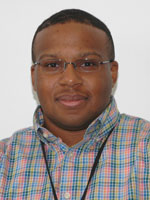Home > About FCA >
Kevin McAdoo
Associate Examiner, Level 3
McLean, Virginia
 “I came to FCA in September 2002 after graduating with an accounting degree from North Carolina A&T State University. My family is not in farming, but I come from rural America so I was acquainted with some aspects of agriculture. One of the first training classes you take as a level 1 examiner is Fundamentals of Examination, which over two weeks exposes you to the basics of the Farm Credit System and farming and how the System differs from commercial banks. So even if you’re not from an agricultural background, the training gets you up to speed quickly on farming issues.
“I came to FCA in September 2002 after graduating with an accounting degree from North Carolina A&T State University. My family is not in farming, but I come from rural America so I was acquainted with some aspects of agriculture. One of the first training classes you take as a level 1 examiner is Fundamentals of Examination, which over two weeks exposes you to the basics of the Farm Credit System and farming and how the System differs from commercial banks. So even if you’re not from an agricultural background, the training gets you up to speed quickly on farming issues.
“I’m now on the third level of my precommissioning training. The third level is when your supervisor makes the big push for you to get all the training you need to take the commissioning test. A secondary purpose is to provide opportunities to train in your chosen career path. In my case, since I want to specialize in capital markets and credit after commissioning, my supervisor arranged for me to spend six months on a rotation with the Bank Management and Risk Team. This specialized training comes out of the individual development plan that every new examiner works out with his or her supervisor to plot a career path.
“The specializations that precommissioned examiners are asked to choose have come about since the reorganization of the Office of Examination [OE] in 2005. Part of the reason for specialization is that as associations merge, their combined operations become more complex, and examiners must have greater skill sets to identify and analyze risk.
“Another outcome of the reorganization is that you now work with examiners from other field offices on examinations. Before, OE had a regional approach, with the individual field offices holding their own portfolios of institutions. Examiners from those offices primarily conducted those institutions’ examinations.
“After you are commissioned, you take additional training in your chosen specialization. For the capital markets specialization, you take courses in banking at banking schools of various universities. When you finish the specialized program and pass the test, you become certified in that area. There are opportunities for advancing your career here.”
- Patrick Fairchild, examiner, Bloomington
- Jennifer Nelson, career intern examiner, level 1, Dallas
- Benjamin McMahan, associate examiner, level 3, Denver
- Kevin McAdoo, associate examiner, level 3, McLean
- Sarah Kreger, certified IT specialist, McLean
- Michael Anderson, program manager, IT/Operations Examination, Denver
- Robert Coleman, Director, Office of Examination, and FCA Chief Examiner, McLean